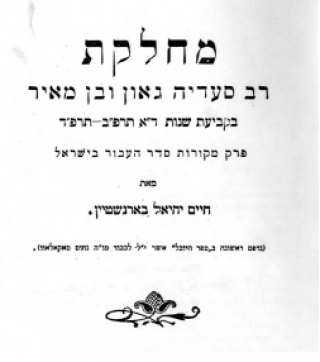In 921/2 CE, a major dispute erupted between the Jews of Palestine and Babylonia about how the calendar should be calculated. This resulted in both communities, followed by other Jews in the Near East, observing the festivals of Passover and the New Year, in 922, on different dates. It was long assumed, in modern scholarship, that this was the last dispute of this kind within rabbinic Judaism, and that the triumph of the Babylonian side led to the finalization of the rabbinic Jewish calendar. Our project has challenged this consensus.

Front page of H. Y. Bornstein 'The Dispute between Rav Saadya Gaon and Ben Meir', Warsaw 1904
Our first aim was to produce a revised edition and analysis of all the documents. In the course of our research, we discovered many new fragments of previously known texts, as well as entirely new texts relevant to the controversy. This opened the way for a revised interpretation of the evidence and its significance, and for a completely new understanding of the controversy, its aftermath, and its impact in the following centuries.
The study of this controversy and its resolution has shed important light on the social and cultural processes that brought about the standardization and fixation of the Jewish calendar in the medieval world. The following questions have been raised:
- How much importance was attached by Palestinians and Babylonians to their disagreement about the dates of the festivals, and why?
- To what extent was their goal to institute a standard calendar, rather than just to prevail in this particular dispute?
- How did the dispute come to an end? Did one of the sides prevail, or did they just lose interest in arguing? Did a standard calendar emerge, in fact, from this dispute?
- What impact did the dispute have on later generations? What long-term effect did it have on the standardization of the Jewish calendar?
Research in this area was carried out by Prof. Sacha Stern, in collaboration with Prof. Marina Rustow (Princeton University). Sacha Stern is now completing a monograph on the controversy of 921/2, bringing together the edition and translation of the manuscripts, and a historical reappraisal of the controversy and its aftermath.
 Close
Close


